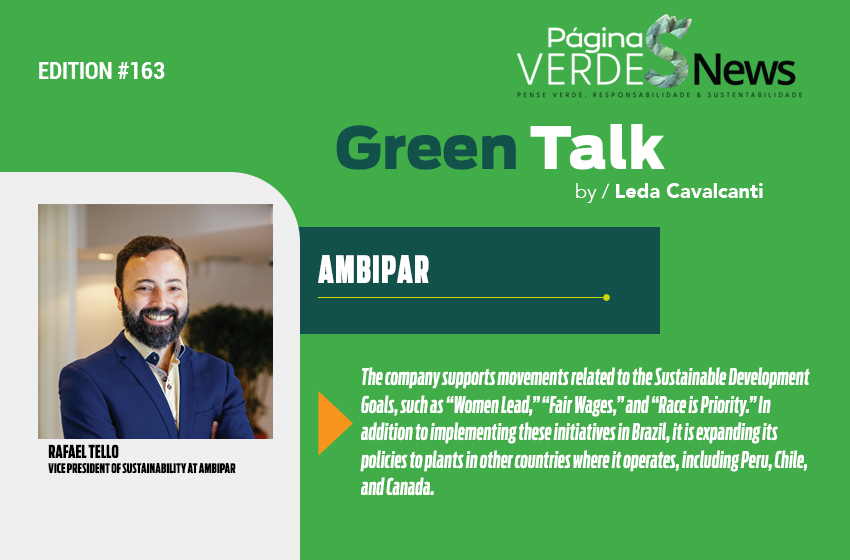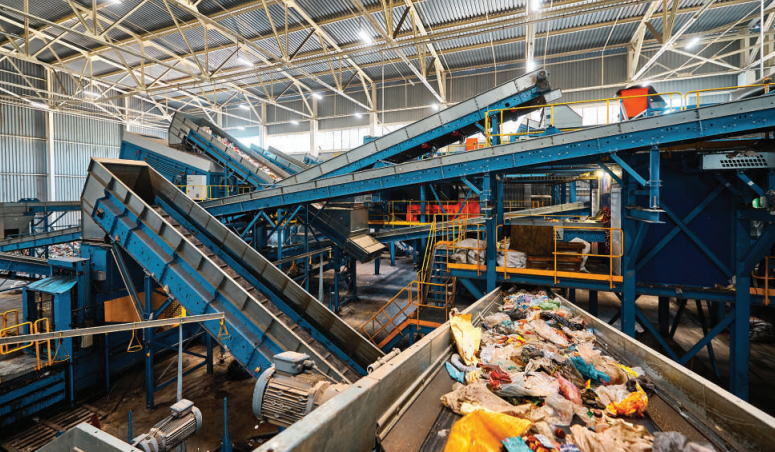
GREEN PAGES – NEWS
THINK GREEN, RESPONSABILITY & SUSTENTABILITY
AMBIPAR
The company supports movements related to the Sustainable Development Goals, such as “Women Lead,” “Fair Wages,” and “Race is Priority.” In addition to implementing these initiatives in Brazil, it is expanding its policies to plants in other countries where it operates, including Peru, Chile, and Canada.
by Leda Cavalcanti

Rafael Tello has been the vice president of Sustainability at Ambipar since November 2021. He graduated in Economics from the Federal University of Minas Gerais (UFMG) and holds a postgraduate degree in Sustainability Management from Leuphana University Lueneburg. He is also a member of the ESG Committee at Bartofil and the Scientific Director of Instituto Atmos. Rafael has been a professor and researcher at Fundação Dom Cabral (FDC), HSM, and a guest lecturer at business schools such as Skema. Additionally, he serves as the coordinator of the Desafio 2030 Network and Hub ODS MG, helping companies align with the 17 Sustainable Development Goals of the United Nations (UN). Through his work, he promotes innovation, growth, and sustainable development in value chains.
With a presence in over 40 countries across six continents, Brazilian multinational Ambipar is a global leader in environmental solutions. Founded to help companies care for the environment, it has been recognized four times as the world’s best developer of forest projects by the Green Project Award.
Listed on the B3 and the New York Stock Exchange, the company has recently been recognized as a green stock by the Brazilian Stock Exchange and certified by Standard & Poor’s (S&P), one of the largest risk rating agencies in the world. This achievement makes Ambipar the first private company in Latin America and the second in Brazil to receive this certification.
To obtain the green stock designation, Ambipar met the B3’s criteria, according to S&P’s audit, including deriving over 50% of its annual gross revenue from green businesses, having investments and operational expenses with the same classification above 50%, and ensuring that no more than 5% of gross revenue comes from fossil fuel activities. Worldwide, only 116 stocks — or 0.02% — of a total of 540,221 stocks listed on major global exchanges are classified as green equity.


PÁGINAS VERDES (GREEN PAGES) – What are the company’s main sustainability programs?
RAFAEL TELLO – Ambipar is a Brazilian multinational and a global leader in environmental solutions. Founded in 1995, its mission is to help other companies care for the planet by aligning environmental and economic development. It has been elected four times as the best developer of forest projects in the world by the Green Project Award and is a pioneer in several products and services. It is a market reference in Research, Development, and Innovation (R&D&I), offering over 100 circular economy solutions, more than 25 patents, and over 50 national and international innovation awards.
PV – How does Ambipar operate? Does it provide environmental consulting? Who are the main companies served?
RT – Ambipar consists of two subsidiaries: Ambipar Response, which focuses on crisis management and environmental emergency response, and Ambipar Environment, which specializes in environmental management and comprehensive waste management. Thus, the company operates across various segments with complete services and products aimed at environmental management, including circular economy, regeneration, energy transition, decarbonization, prevention, and climate crisis management and response. Furthermore, it offers ESG consulting services to various companies across different segments to assist clients in structuring their sustainability initiatives.
“One of Ambipar’s corporate goals is to become a consistent leader in the transition to a circular and low-carbon economy by 2030.”
PV – How does each subsidiary operate?
RT – Ambipar Response has more than 4,000 environmental projects and services related to fauna, as well as 27,000 environmental analyses for clients and partners. The subsidiary has four major business units: response and emergency, industrial services, environmental services, and marine services across Brazil, Latin America, the United States, Canada, and Europe. For operations, the company has a fleet of 120 vessels and over 30 aircraft.
Ambipar Environment manages 3.8 million tons of solid waste annually and recycles more than 3 million tons of waste. This division has five business units: waste management and valorization, circular economy, ESG consulting and compliance, decarbonization, and Hazmat logistics (hazardous materials). The company also manages hazardous and non-hazardous waste after industry and post-consumption, focusing on zero landfill. In this work, Ambipar analyzes the waste generated by clients, establishes management bases, identifies valorization opportunities, performs transportation and treatment, and ensures proper final disposal. In post-consumption, it works on three fronts: recycling credits, circular cities, and recycling hubs.
Ambipar Environment also owns one of the largest circular economy centers in the world, located in Santiago, Chile. In its decarbonization projects, over 2.5 million hectares have already been preserved in Brazil’s major biomes.
PV – What are the main results achieved so far?
RT – Listed on the B3 and the New York Stock Exchange, Ambipar has recently been recognized as a green stock by the Brazilian Stock Exchange and certified by Standard & Poor’s (S&P). This achievement makes the company the first private entity in Latin America and the second in Brazil to receive this certificate.
To receive the green stock designation, Ambipar met B3’s criteria, according to S&P’s audit, including deriving over 50% of its annual gross revenue from green businesses and ensuring that investments and operational expenses with the same classification exceed 50%, along with 5% of gross revenue from fossil fuel activities. Globally, only 116 stocks — 0.02% of 540,221 stocks listed on major exchanges — are classified as green equity.
Financially, Ambipar achieved record net revenue and EBITDA (earnings before interest, taxes, depreciation, and amortization) in the second quarter of this year, totaling BRL 1.41 billion and BRL 436.4 million, respectively. With the largest numbers in its history, we are on track to meet our estimates for 2024.
PV – Tell us about the projects, such as what is being done with recycling cooperatives. What results have been obtained?
RT – Through Ambipar Environment’s work, we have direct and indirect partnerships with over 250 cooperatives. The most recent highlight is our partnership with the National Association of Collectors of Recyclable Materials (ANCAT) to create the Circular Project. This project aims to transform the operations of cooperatives through professionalizing the waste treatment process. ANCAT has hundreds of associated cooperatives and has recovered thousands of tons of waste, accounting for over 20% of recyclable material collection in Brazil.
With the Circular Project, ANCAT and we aim to transform the operations of cooperatives by professionalizing the entire waste treatment process and supporting the formalization of collectors, along with the installation and upgrading of equipment for handling and sorting materials.
The project also plans to replace traditional carts used by recycling professionals with electric tricycles to facilitate transportation, increase productivity, and reduce load. This optimizes manual labor and utilizes clean and sustainable energies for the environment, providing more dignity to these professionals.
PV – What are the company’s goals for carbon emission reduction? What other sustainability goals are defined?
RT – We work with various companies to reduce carbon dioxide emissions. One of our initiatives is a partnership with SAP to offer “Net Zero as a Service” to clients and support the fight against climate change. This service combines SAP’s robust cloud solutions with Ambipar’s deep expertise in generating and trading carbon credits, helping clients manage and offset emissions in an integrated way. This provides clients with access to a simple yet comprehensive solution that contributes to a low-carbon economy.
In addition to assisting companies, one of Ambipar’s corporate goals is to become a consistent leader in the transition to a circular and low-carbon economy by 2030. Under a public commitment submitted to the SBTi, our target is to reduce emissions by 50% by 2030 compared to 2022 levels, aiming for Net Zero by 2050.

PV – How does the company act in terms of social inclusion?
RT – Ambipar believes that diversity and inclusion are fundamental to innovation and sustainable growth. We are committed to fostering a workplace that values diversity in gender, color, race, and religion. To achieve this, we have a diversity and inclusion policy aimed at promoting transparency and standardizing the company’s daily dynamics.
PV – What projects does Ambipar support?
RT – Ambipar supports movements linked to the Sustainable Development Goals, such as “Women Lead,” “Fair Wages,” and “Race is Priority.” In addition to implementing these initiatives in Brazil, we are expanding our policies to plants in other countries where we operate, including Peru, Chile, and Canada. We have partnered with the Federation of Industries of the State of São Paulo (FIESP) and the Brazil Network of the Global Compact to develop female leadership, reaching over 50 professionals in two years of work.
In this way, Ambipar is dedicated to promoting racial and gender equity, as well as supporting other minority groups, ensuring equal salaries and benefits for professionals who perform similar responsibilities. As part of our diversity and inclusion policy, 30% of the seats in the company’s governance bodies are held by women.
Source: Eletrolar News Magazine – Edition #163





